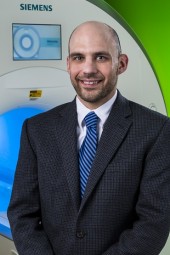Kessler Foundation researchers link endogenous body temperature to relapsing-remitting MS and fatigue

West Orange, NJ. March 18, 2014. Kessler Foundation researchers have demonstrated for the first time ever that body temperature is elevated endogenously in relapsing-remitting multiple sclerosis (RRMS) and linked to worse fatigue. The article was published ahead of print on Feb. 21, 2014 in Archives of Physical Medicine & Rehabilitation. Sumowski J, Leavitt V: Body temperature is elevated and linked to fatigue in relapsing-remitting multiple sclerosis, even without heat exposure. doi:10.1016/j.apmr.2014.02.004.
Researchers measured body temperature in 50 patients with RRMS, 40 matched healthy controls, and 22 patients with secondary progressive MS (SPMS). They looked at whether resting body temperature was elevated in patients with RRMS and whether elevation was linked to fatigue, a prevalent, disabling, and recalcitrant symptom in this population.
“We found that body temperature was elevated among patients with RRMS and linked to worse fatigue,” reported Dr. Sumowski, research scientist in Neuropsychology & Neuroscience Research. “Our findings support those of randomized controlled trials of cooling garments and antipyretics, which have been shown to effectively reduce fatigue in MS. More studies are needed to investigate the complex relationships among fatigue, body temperature and inflammatory processes in RRMS.”
Funding for this project was provided in part by the National Institutes of Health (R00HD060765 to JFS) and Kessler Foundation.
Recent publications:
Sumowski J, Chiaravalloti N, Krch D, et al. Education attenuates the negative impact of traumatic brain injury on cognitive status. Arch Phys Med Rehabil 2013;94(12):2562-4.
Retrieval practice is a robust memory aid in memory-impaired patients with multiple sclerosis. Mult Scler 2014;95(2):397-400.
About MS Research at Kessler Foundation
Kessler Foundation's cognitive rehabilitation research in MS is funded by grants from the National Institutes of Health, National MS Society, NJ Commission of Brain Injury Research, Consortium of MS Centers, and Kessler Foundation. Under the leadership of John DeLuca, PhD, senior VP for Research & Training, and Nancy Chiaravalloti, PhD, director of Neuropsychology & Neuroscience Research, scientists have made important contributions to the knowledge of cognitive decline in MS. Clinical studies span new learning, memory, executive function, attention and processing speed, emotional processing, employment and cognitive fatigue. Research tools include innovative applications of neuroimaging, iPADs, and virtual reality. Among recent findings are the benefits of cognitive reserve and aerobic exercise; correlation between cognitive performance and outdoor temperatures; efficacy of short-term cognitive rehabilitation using modified story technique; factors related to risk for unemployment, and the correlation between memory improvement and cerebral activation on fMRI. Foundation research scientists have faculty appointments at Rutgers New Jersey Medical School. The opening of the Neuroimaging Center at Kessler Foundation in 2013 has greatly expanded the Foundation’s capability for neuroscience research in MS and other neurological conditions.
About Kessler Foundation
Kessler Foundation, a major nonprofit organization in the field of disability, is a global leader in rehabilitation research that seeks to improve cognition, mobility and long-term outcomes, including employment, for people with neurological disabilities caused by diseases and injuries of the brain and spinal cord. Kessler Foundation leads the nation in funding innovative programs that expand opportunities for employment for people with disabilities. For more information, visit KesslerFoundation.org.
facebook.com/KesslerFoundation
Carolann Murphy, PA; 973.324.8382; CMurphy@KesslerFoundation.org
Lauren Scrivo, 973.324.8384/973.768.6583 (cell); LScrivo@KesslerFoundation.org
Media Contact
All latest news from the category: Health and Medicine
This subject area encompasses research and studies in the field of human medicine.
Among the wide-ranging list of topics covered here are anesthesiology, anatomy, surgery, human genetics, hygiene and environmental medicine, internal medicine, neurology, pharmacology, physiology, urology and dental medicine.
Newest articles

Superradiant atoms could push the boundaries of how precisely time can be measured
Superradiant atoms can help us measure time more precisely than ever. In a new study, researchers from the University of Copenhagen present a new method for measuring the time interval,…

Ion thermoelectric conversion devices for near room temperature
The electrode sheet of the thermoelectric device consists of ionic hydrogel, which is sandwiched between the electrodes to form, and the Prussian blue on the electrode undergoes a redox reaction…

Zap Energy achieves 37-million-degree temperatures in a compact device
New publication reports record electron temperatures for a small-scale, sheared-flow-stabilized Z-pinch fusion device. In the nine decades since humans first produced fusion reactions, only a few fusion technologies have demonstrated…





















